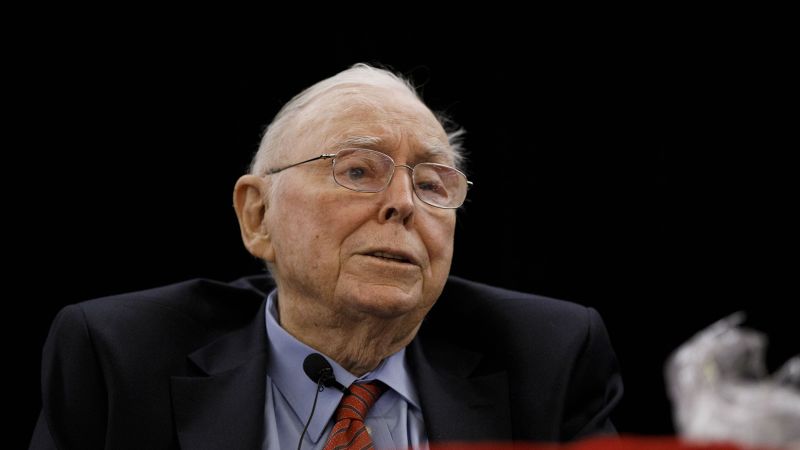Warren Buffett’s decision to invest billions of dollars into Japan was “a no-brainer” that felt like a gift from God, according to his business partner.
“It was awfully easy money,” Charlie Munger, Buffett’s longtime lieutenant and vice chair of Berkshire Hathaway (BRKA), said in an interview with the Acquired podcast released this week.
“It was like having God just opening a chest and just pouring money into it.”
In the summer of 2020, Berkshire revealed it had bought stakes of about 5% in each of Japan’s top five trading companies. In total, the American industrial and insurance conglomerate invested $6.7 billion at the time, while telling shareholders it could hold and increase the size of those holdings over the long run.
This year, as Japan’s stock markets rocketed to 33-year highs, Berkshire disclosed it had in fact doubled down, taking its stakes in each company to an average of more than 8.5%. The US giant still has room to run, as it has previously stated it could eventually raise its stakes of each firm to 9.9%.
Japan’s Nikkei and Topix indexes are each up more than 20% so far this year.
The firms backed by Berkshire — Itochu, Marubeni, Mitsubishi Corporation, Mitsui & Co., and Sumitomo — are known as “sogo shosha” or general trading companies in Japan. They play a vital role in the country’s economy, dealing in a wide range of industries, including energy, technology and manufacturing.
Munger described the investment opportunity as a rare chance to get in on stable assets with huge cash flow and very little risk. “Something like that — if you’re as smart as Warren Buffett, maybe two, three times a century, you had an idea like that,” said the 99-year-old.
Berkshire was able to pull off its biggest bet outside the United States because of Japan’s historically low interest rates, the executive explained. That meant the conglomerate could borrow money cheaply as far as 10 years in advance, and use the funds to buy stocks with 5% dividends, he said.
“These trading companies were really entrenched, old companies, and they had all these cheap copper mines and rubber plantations, and so you could borrow [easily],” Munger added.
He suggested that Berkshire was in a unique position to borrow at a low interest rate because of its strong credit rating. Other companies “couldn’t get it,” he said. “But Berkshire, with its credit, could. The only way you could get it was to be very patient and just pick away at little pieces at a time. It took forever.”
Now, the conglomerate has invested at least $10 billion, according to Munger.
Buffett’s decision to invest in Japan has buoyed optimism about prospects in the world’s third largest economy. The legendary investor has previously cheered “the future of Japan,” casting more attention to the country from other foreign backers.
In his wide-ranging interview, Munger weighed in on investments elsewhere in Asia.
BYD, the Chinese electric vehicle maker that counts Berkshire as a longtime investor and competes fiercely with Tesla (TSLA), is a “miracle,” he mused.
“But that guy works 70 hours a week and has a very high IQ. He can do things you can’t do,” said Munger, in an apparent reference to BYD’s billionaire founder and chairman Wang Chuanfu.
Outside “one or two” automakers that have excelled in electric cars, Munger said he was not a fan of trying to pick winners in the sector, revealing that he had lost money on an investment in South Korea’s Hyundai Motor.
Beyond the market leaders, “I just don’t even look at the auto industry,” he added.
Munger also stuck to Berkshire’s position on Taiwanese chipmaker TSMC (TSM), saying he would prefer “something with a real consistent brand of its own, like Apple.” The iPhone maker has long been one of Berkshire’s top holdings, which was worth $177.6 billion as of the second quarter.
Earlier this year, in a rare reversal, Berkshire said it had dumped its entire stake in TSMC, after the “Oracle of Omaha” expressed unease about its homebase of Taiwan and geopolitical tensions. The semiconductor giant is considered a national treasure in Taiwan, and its presence is seen as providing a strong incentive to the West to defend the island against any attempt by China to take it by force.
And despite the troubles bedeviling the world’s second largest economy, Munger gave it a thumbs up, saying: “The Chinese economy has better future prospects for the next 20 years than almost any other big economy.”
China’s leading companies are “stronger and better” than leading companies virtually anywhere else, while being available “at a much cheaper price,” he added. “So naturally, I’m willing to have some China risk in the Munger portfolio.”
However, looking at the investment landscape more broadly, Munger suggested the days of finding easy opportunities had dwindled. In the early days of Berkshire’s operation, “there was a lot of low-hanging fruit,” he said.
“You don’t have any low hanging fruit that is easy right now.”
Read the full article here
